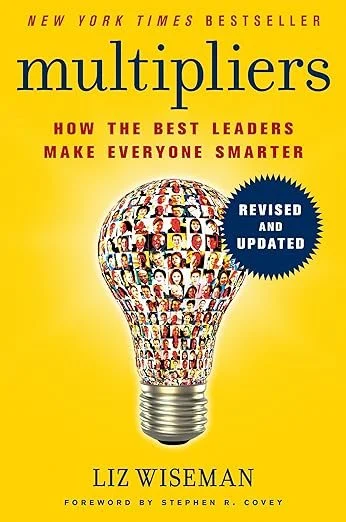Are You a Genius? Or a Genius-Maker?
One of my favorite leadership books of the past decade is by Liz Wiseman, and is called Multipliers: How The Best Leaders Make Everyone Smarter. This book resonates with my leadership philosophy more than just about any other book I've read. As an appetizer, here is how Liz defines two types of leaders:
Diminishers: "Some leaders seemed to drain intelligence and capability out of the people around them. Their focus on their own intelligence and their resolve to be the smartest person in the room had a diminishing effect on everyone else. We've all worked with these black holes. They create a vortex that sucks energy out of everyone and everything around them. When they walk into a room, the shared IQ drops and the length of the meeting doubles. In countless settings these leaders were idea killers and energy destroyers. Other people's ideas suffocated and died in their presence and the flow of intelligence came to an abrupt halt around them. Around these leaders, intelligence flowed only one way: from them to others." (Liz Wiseman, Multipliers)
I just have to ask, have you worked with this person?
I’ve had the opportunity to work with hundreds of organizations, and you can always tell when a staff is led by a diminisher. No one speaks up in meetings. Ideas get batted down by the “leader,” so people just learn to stay silent. Why? It’s not worth it. The diminisher is going to do whatever they want regardless of the discussion.
The diminisher walks into the room talking. The diminisher only asks questions in a leading way to affirm the point she is making. The diminisher believes they are right, and the people in the room exist to serve their own purposes. When you work for a diminisher, you want to give up. You don't enjoy going to work, and you can't wait to leave at the end of the day. You keep your head down, under the radar, so none of the diminisher's energy gets directed at you. You check your brain at the door since it is no longer needed. You learn how to follow orders without asking questions.
Thankfully, there is another type of leader…
Multipliers: "Other leaders used their intelligence in a fundamentally different way. They applied their intelligence to amplify the smarts and capability of people around them. People got smarter and better in their presence. Ideas grew; challenges were surmounted; hard problems were solved. When these leaders walked into a room, light bulbs started going off over people's heads. Ideas flew so fast that you had to replay the meeting in slow motion just to see what was going on. Meetings with them were idea mash-up sessions. These leaders seemed to make everyone around them better and more capable. These leaders weren't just intelligent themselves--they were intelligence Multipliers. Perhaps these leaders understood that the person sitting at the apex of the intelligence hierarchy is the genius maker, not the genius." (Liz Wiseman, Multipliers)
My prayer is that you will be a multiplying leader, forever tapping the genius of the people around you. This requires humility—being okay when others get the accolades. It requires intentionality—constantly looking for the genius in others. It requires asking more questions even when you think you know the answer. It is about calling out what you see in someone else, even when they don't see it yet.
Be honest: Would the people around you consider you to be a diminisher? Or a multiplier? If you are really brave, have them read this article and then have a conversation. Very few diminishers are doing so intentionally. You may need a mirror to help you see where you can improve.
"A multiplying leader is someone who sees the untapped potential in the people around them and makes it their mission to unleash it." (Liz Wiseman, Multipliers)
Now, go be a genius-maker. That's how we change the world.


